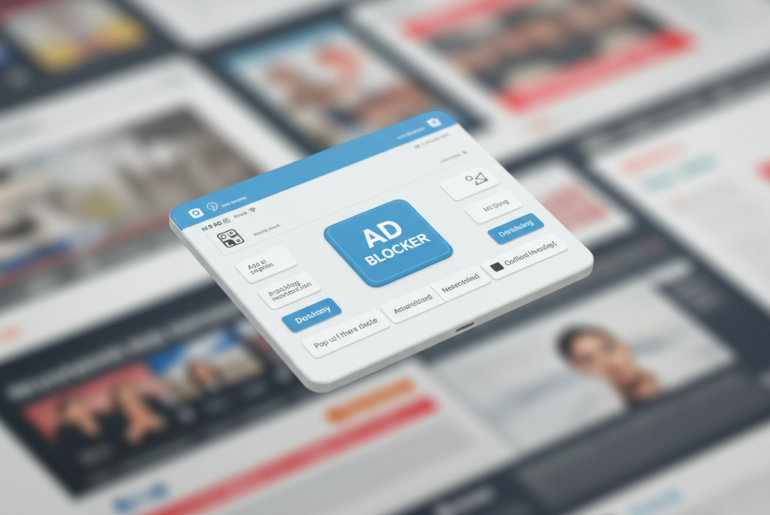This article may contain references to products or services from one or more of our advertisers or partners. We may receive compensation when you click on links to those products or services. Nonetheless, our opinions are our own.
The information presented in this article is accurate to the best of our knowledge at the time of publication. However, information is subject to change, and no guarantees are made about the continued accuracy or completeness of this content after its publication date.
In today’s digital landscape, where ads seem to follow you from site to site, it’s no wonder you might consider using an ad blocker. You’ve probably heard both praise and criticism for these tools, and now, you might be wondering: what do you gain, and what do you stand to lose by adopting them? By delving into the complexities of ad blockers, you’ll uncover a nuanced perspective on how they can enhance your browsing experience while also shaping the websites you visit. We’ll guide you through the benefits and drawbacks, providing a clear understanding of how these tools can impact your online life. Whether you’re looking for a distraction-free experience or hoping to protect your privacy, the choice to use an ad blocker comes with its own set of trade-offs worth exploring.
- Understanding the Benefits of Ad Blockers for Your Online Experience
- The Hidden Costs of Ad Blocking on the Websites You Love
- Balancing Your Privacy: How Ad Blockers Protect You
- Navigating the World of Free Content: What You Should Know
- Finding the Right Ad Blocker: A Guide to Your Options
- Making Informed Choices: Weighing Gains Against Losses in Digital Advertising
- Final Thoughts
- Frequently Asked Questions
- Recommended Reads
Understanding the Benefits of Ad Blockers for Your Online Experience
Using ad blockers can considerably enhance your online experience, offering a range of benefits that many users find compelling. By eliminating disruptive ads, you can enjoy a faster browsing speed, which means less time waiting for pages to load and more time engaging with the content that matters to you. Additionally, fewer ads mean reduced visual clutter on your screen, allowing you to focus on the data or services you genuinely seek without the distraction of pop-ups or auto-playing videos. Here are some benefits you can expect:
- Improved Page Load Times: Websites can load faster when they are stripped of heavy ad content, providing a smoother user experience.
- Enhanced Privacy: Many ads track your online activities. By using an ad blocker, you can minimize data collection and protect your personal information.
- Less Cognitive Overload: The absence of advertisements can make it easier to process information and reduce distractions, enhancing your overall comprehension.
However, it’s essential to recognize what you may lose by using ad blockers. Many websites rely on advertising revenue to provide free content, and blocking ads can financially undermine these platforms. If you wish to support your favorite sites, consider whitelisting them in your ad blocker. The choice is yours, but understanding both sides can help you make a more informed decision.
While ad blockers can provide a cleaner browsing experience, they come with their own set of hidden costs that you might not promptly notice. Many websites rely on advertising revenue to operate, and when you block these ads, you’re directly impacting their ability to provide free content. It’s easy to forget that behind every article and video, some creators and developers work hard, expecting to be rewarded for their efforts. Without your engagement, these platforms may struggle to survive or be forced to implement paywalls, which could limit access to the content you love.
Consider these points when assessing the impact of your ad blocker:
- Content Quality: Many sites may cut corners or compromise the quality of their work if ad revenue dwindles.
- Access Restrictions: Some sites may block access entirely for users with ad blockers enabled, preventing you from viewing content.
- Increased Paywalls: As ad revenue decreases, more sites may transition to subscription models, forcing users to pay for content that was once free.
Balancing Your Privacy: How Ad Blockers Protect You
When you choose to use ad blockers, you’re effectively putting up a shield between yourself and the multitude of online advertisements that can compromise your privacy. By blocking ads, you reduce the risk of being tracked by third-party advertisers who frequently gather data about your browsing habits to create targeted ads. This means you can enjoy a more streamlined online experience without feeling overwhelmed by intrusive advertisements. Here’s what you gain:
- Enhanced Privacy: You significantly limit the amount of personal data that advertisers can collect.
- Faster Browsing: By removing ads, pages load quicker, which can save you time and frustration.
- Improved Focus: With fewer distractions, you can concentrate on the content that truly matters to you.
However, it’s essential to acknowledge what you might be giving up in the process. Many websites rely on ad revenue to provide free content, so your decision to block ads can sometimes result in a diminished user experience. Notably:
- Blocked Content: Some sites may restrict access to their content for users with ad blockers enabled.
- Missing Out on Offers: You may miss targeted promotions or deals that align with your interests.
Ultimately, using an ad blocker is a personal choice that balances the protection of your privacy with the potential loss of access to specific online resources. Consider how important these factors are to you and make an informed decision based on your browsing habits.
Voted "Best Overall Budgeting App" by Forbes and WSJ
Monarch Money helps you budget, track spending, set goals, and plan your financial future—all in one app.
Get 50% OFF your first year with code MONARCHVIP
Using ad blockers can seem like a straightforward decision, especially given the allure of an uninterrupted browsing experience. However, there’s more to consider than just a clean screen. On one hand, you gain a distraction-free experience that allows you to consume content without pop-ups or auto-play videos that can detract from your focus. Moreover, you can enjoy faster loading times and increased privacy, shielding yourself from tracking cookies used by advertisers. But while you’re enjoying these benefits, you might also overlook what you’re losing.
Running ad blockers often means depriving content creators of revenue that keeps them running their websites and producing quality material. Many sites rely on ad revenue to remain operational and fund the creation of the content you love. By blocking ads, you may inadvertently contribute to the decline of your favorite free resources. Here’s a simple overview of what you gain and lose:
| Pros of Ad Blockers | Cons of Ad Blockers |
|---|---|
| Distraction-free browsing | Reduced funding for content creators |
| Faster load times | Access to premium content may be restricted |
| Enhanced privacy | Potential website malfunctions or errors |
Ultimately, finding a balance between your online comfort and supporting the creators you appreciate is key. You may want to consider whitelisting sites that provide valuable content to ensure they can continue delivering what you love most.
Finding the Right Ad Blocker: A Guide to Your Options
When it comes to choosing an ad blocker, you have several options to consider, each with its unique features and potential drawbacks. Popular choices include uBlock Origin, known for its lightweight performance and customizable filters, and AdGuard, which offers a built-in security feature for browsing. Alternatively, you might consider browser-specific options, such as AdBlock Plus or Ghostery, which not only block ads but also help protect your privacy by managing trackers.
Before settling on one, think about what you value most in your browsing experience:
- Performance: Will the ad blocker slow down your browser?
- Customization: Do you want to have control over which ads to block or allow?
- Privacy: Are you concerned about tracking, and does the ad blocker offer additional features to address this concern?
- Support for Sites: Are you willing to support your favorite sites by allowing certain ads?
Ultimately, the right choice for you will depend on striking a balance between an uninterrupted browsing experience and supporting content creators. It may also be worthwhile to test a few options to see which one aligns best with your habits and preferences.
Making Informed Choices: Weighing Gains Against Losses in Digital Advertising
You might feel empowered when you install an ad blocker, enjoying a cleaner browsing experience without those flashy, intrusive ads cluttering your screen. The gains of using ad blockers include:
- Increased Speed: Pages load faster without ads that bog down performance.
- Enhanced Privacy: You reduce the tracking of your online activity by advertisers.
- Less Distraction: You can focus more on the content you want to engage with.
However, this choice comes with its own set of drawbacks. The losses you might face are equally important:
- Missing Personalized Content: Ads can sometimes introduce you to products and services relevant to your interests.
- Supporting Free Content: Many websites rely on ad revenue, and by blocking ads, you might potentially be undermining the creators and platforms you enjoy.
- Limited Features: Some sites restrict access to content or features for users with ad blockers enabled.
Consider this simple table that highlights the trade-offs:
| Aspect | With Ad Blocker | Without Ad Blocker |
|---|---|---|
| Browsing Speed | Faster | Slower |
| Privacy | Higher | Lower |
| Content Discovery | Limited | Greater |
| Support for Websites | Lower | Higher |
When considering these factors, it is helpful to reflect on your habits and priorities. Are the benefits of a simplified online experience worth the potential downsides? Making informed decisions is key to maintaining your digital freedom and supporting the platforms you love.
Final Thoughts
Ultimately, whether to use an ad blocker depends on your browsing priorities. These tools offer significant benefits, such as faster loading times, enhanced privacy, and a more focused, ad-free browsing experience. However, it’s essential to consider the costs, including the potential harm to content creators who rely on advertising revenue and the possible restrictions on access to specific websites.
The decision to block ads should be made with an awareness of the broader impact. You can strike a balance by whitelisting trusted sites or supporting content creators through other means if you choose to block ads. Ultimately, the goal is to enhance your online experience while respecting the ecosystem of free and accessible content.
By understanding both the advantages and challenges of ad blockers, you can make a more informed choice that aligns with your values and browsing habits. Whether you prioritize privacy, speed, or content accessibility, being mindful of the trade-offs will help you create a more satisfying and responsible digital environment.
Frequently Asked Questions
What are the main benefits of using ad blockers?
Using ad blockers can significantly enhance your browsing experience. You often enjoy faster page load times, as ads typically consume a lot of bandwidth. Additionally, ad blockers can reduce distractions, allowing you to focus on the content that matters most to you. Many users appreciate having a cleaner, more streamlined interface that is free from the clutter of ads. There’s also an element of increased privacy, as ad blockers can help prevent tracking by third-party advertisers.
What drawbacks come with using ad blockers?
While ad blockers have their benefits, they also have notable drawbacks. One major issue is that many websites rely on ad revenue to sustain their content. By blocking ads, you may inadvertently support the decline of free content. Additionally, some sites may restrict access or prompt you to disable your ad blocker, which can be frustrating. There’s also the possibility of missing out on personalized content or offers that are tailored to your interests based on your browsing history.
How do ad blockers affect the websites I visit?
Ad blockers can impact the websites you visit in several ways. For one, if a website’s revenue is heavily dependent on ads, its ability to provide content may suffer if many visitors use ad blockers. This could result in less frequent updates, fewer features, or even the site’s closure. Moreover, some sites have started implementing measures to detect ad blockers and may ask users to either whitelist them or face limited access.
Can ad blockers improve my online security?
Yes, ad blockers can enhance your online security to some extent. By filtering out ads, they also reduce the risk of encountering malicious ads, also known as “malvertising,” which can lead to malware infections or phishing attempts. Additionally, many ad blockers tackle known tracking scripts, which can protect your privacy and reduce data leakage during your browsing sessions.

Reviewed and edited by Albert Fang.
See a typo or want to suggest an edit/revision to the content? Use the contact us form to provide feedback.
At FangWallet, we value editorial integrity and open collaboration in curating quality content for readers to enjoy. Much appreciated for the assist.
Did you like our article and find it insightful? We encourage sharing the article link with family and friends to benefit as well - better yet, sharing on social media. Thank you for the support! 🍉
Article Title: Everything You Need to Know About Ad Blockers
https://fangwallet.com/2025/04/26/everything-you-need-to-know-about-ad-blockers/The FangWallet Promise
FangWallet is an editorially independent resource - founded on breaking down challenging financial concepts for anyone to understand since 2014. While we adhere to editorial integrity, note that this post may contain references to products from our partners.
The FangWallet promise is always to have your best interest in mind and be transparent and honest about the financial picture.
Become an Insider

Subscribe to get a free daily budget planner printable to help get your money on track!
Make passive money the right way. No spam.
Editorial Disclaimer: The editorial content on this page is not provided by any of the companies mentioned. The opinions expressed here are the author's alone.
The content of this website is for informational purposes only and does not represent investment advice, or an offer or solicitation to buy or sell any security, investment, or product. Investors are encouraged to do their own due diligence, and, if necessary, consult professional advising before making any investment decisions. Investing involves a high degree of risk, and financial losses may occur including the potential loss of principal.
Source Citation References:
+ Inspo
There are no additional citations or references to note for this article at this time.












































